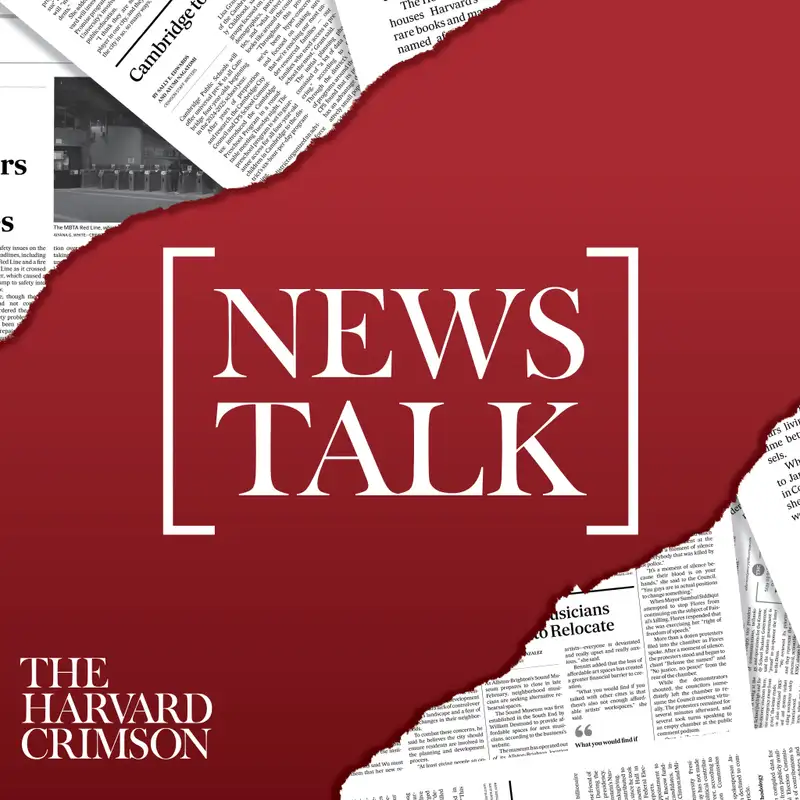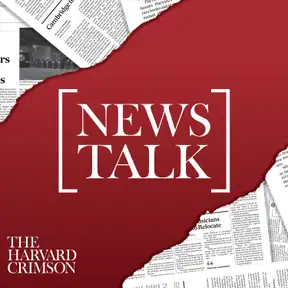
Harvard Law School Students Targeted by Doxxing Truck
This transcript was generated automatically by https://otter.ai. Its accuracy may vary.
Yael Goldstein 0:08
On Friday morning, March 29, the Harvard Law School student government passed a resolution calling on the Harvard Management Corporation to divest from Israel. On Tuesday, April 2, a truck displaying the faces of HLS Student Government co-presidents made its way around campus. The "doxxing truck" has been a familiar presence on campus since October 7. As the Harvard Undergraduate Association initiates a referendum on divestment — although now postponed — students are left with two major questions. First, what is Harvard doing to ensure the safety and security of its students? And second, are political statements in the purview of student governments? Two members of the Crimson Editorial board, join us to discuss.
From the Harvard Crimson I'm Yael Goldstein, and this is Newstalk.
Vander O.B. Ritchie 1:08
I'm Vander Ritchie, class of 2026. And I am an editorial editor.
Jasmine N. Wynn 1:12
My name is Jasmine Wyn class of 2027. And I'm also an editorial editor.
Yael Goldstein 1:17
Thank you so much for joining me Vander and Jasmine. Another Daxing. Chuck has made its rounds on Harvard's campus, this time displaying the names of HLS Student Government co-presidents, the editorial board has consistently maintained that Daxing is neither a productive nor legitimate form of counter-speech. So let's start with Harvard's response to these doxxing checks. What are your respective stances on the actions taken by the university thus far?
Vander O.B. Ritchie 1:42
I have found the university response somewhat lacking. I think it is a really difficult situation and that Harvard and Harvard students have been thrust into the spotlight that our student body and our school have been used to play political games, by politicians, by organizations by outside actors. And that's an uncomfortable position for the administration and for students to be in. That being said, doxxing is something that directly affects student safety and student health. And personally, I would like to see the university respond more forcefully to that.
Jasmine N. Wynn 2:15
Yeah, I would also second that, I think especially after the most recent iteration of doxxing trucks in Harvard Square, I would hope at this point that Harvard has a more formalized outreach mechanism for reaching out to people that have been affected by doxxing, especially considering how widespread it's been this year. And I could honestly see it continuing to be this widespread in the future, although maybe to a lesser degree, I just think that Harvard should take more steps to formalize mechanisms of support for students that are impacted and do a better job of reaching out.
Yael Goldstein 2:46
And how would you characterize the reactions of students around you?
Vander O.B. Ritchie 2:49
The trucks have been scary. There have been tons of reports, especially in places like the New York Times that talk about a culture of antisemitism at Harvard. In general, I think that often publications will exaggerate the amount of antisemitism, which causes outside actors to feel like they need to take a huge stance against what they see as a festering group of Hamas supporters in Cambridge, Massachusetts. And it's just caused tons of students who are unaffiliated who just want to live their lives feeling threatened because of their political stances. And that is unacceptable. And honestly, it makes going to school here sometimes somewhat uncomfortable.
Jasmine N. Wynn 3:32
Yeah, I think it makes students a lot more scared to speak out about their views, especially relating to Israel-Palestine. I have a lot of friends that are also pro-Palestinian that are super scared to make any sort of public statement affirming their support for Palestine, not because necessarily they think their opinion is wrong or anything of that sort. It's just more of the fear of the hostility, that the doxxing trucks have somewhat encouraged within the student body as well as outside of Harvard in the neighboring area that can make it really scary to navigate campus from time to time.
Yael Goldstein 4:02
And do you get the impression that there are adequate supports institutionally for Jewish students and Palestinian students on campus?
Vander O.B. Ritchie 4:11
I can speak specifically to Jewish students. Earlier this year, the Harvard administration created an Antisemitism Task Force chaired by Professor Derek Penslar. I have been a part of conversations with him about the atmosphere on campus. The university is I think, in terms of Jewish students doing the best that it can to address antisemitism and is appointing people to work on this that are critical that care about your students and care about Jewish student health. I think that while there is still work to do, this is a fantastic step forward.
Jasmine N. Wynn 4:43
As someone who has quite a few close Palestinian friends on this campus, the institutional support has not been nearly enough so far. The fact that it took until January, I believe, for a task force to be announced to combat anti-Palestinian, anti-Arab racism, and Islamophobia is unacceptable. Watching them go through the fall and navigating the political environment, especially with a lack of institutional support emails that refused to even mention the word Palestine. It felt a lot for them as a form of erasure because it is. And I think that going forward, I would hope to see a lot more institutional support in a formalized manner for Palestinian students on this campus.
Yael Goldstein 5:27
So these doxxing checks ultimately arrived on campus as a result of the HLS Student Government resolution, but they might not be the only student government in the university engaging in political action. This past Tuesday, the undergraduate Palestine Solidarity Committee passed a petition which in turn initiated a referendum asking Harvard called students whether Harvard ought to divest from institutions supporting the war in Gaza in "Israel's occupation of Palestine." I'm curious about where both of you stand with respect to student government's obligation, or lack thereof, to engage in political activism of any kind.
Jasmine N. Wynn 6:03
As someone that is an organizer with fossil fuel divest Harvard, I am in favor of student government being a platform for students to voice concerns, especially regarding Harvard's investments in harmful industries and entities. During the 2010s, during our divestment campaign, it was very useful having these referenda passed and conducted among the student body to really get the message across that fossil fuel divestment was the ethical and moral choice. And I think especially as Harvard explores the realm of institutional neutrality and institutional restraint, there have to be new platforms for students to voice and pressure their university to take certain stances on issues, especially regarding their investments. I think the current approach to student government being a platform for certain political issues is a good thing. But obviously, it will evolve as all things do.
Vander O.B. Ritchie 6:57
I think there are a lot of things that I agree with you on. There's also a couple of key points that I think I disagree with you on. I think first, it is definitely true that divestment is a good strategy. And it's a strategy that is appropriate for student organizations to take when it comes to the university. This is a political stance that the university is taking, and they're directly advocating for changes and university policy. I also am amenable to the idea of referendums because I like student voices being heard and students being able to speak. However, in general, I am wary about student body governments making political statements on behalf of students. One of the first issues is that at Harvard, for reasons that I don't know, participation in student government is incredibly low. We have usually between 10 to 20% of turnout in student body elections. On top of that, when candidates run for student body positions, they do not run on their political positions, they run on Board Plus, on free laundry, on things like that. So I am uncomfortable with a body that purports to represent the entire student body making political statements that one: very few students approved of those making the statements and two: the students didn't approve of those people on their political stances. It feels misrepresentative of the student body. And as somebody who is integrated with Jewish student communities and zionist communities, it can feel particularly alienating to them.
Yael Goldstein 8:28
Jasmine, would you like to respond to that?
Jasmine N. Wynn 8:30
Yeah, I think the key point about a lot of the referenda that are introduced is that it's conducted through a petition format to have it introduced initially, and a lot of the time those petitions are signed by student orgs or just regular members of the student body that wants to see this issue brought to the forefront. Although I do see the concern about having government representatives so aren't necessarily elected on their political stances. I think that's somewhat can be misguided because I think especially with the last HUA election that we just saw past there were some political elements to some of the candidates running. Specifically, I'm thinking of the Chiocco-Brackeen ticket. I remember during the debate that they hosted earlier this month, they did briefly mentioned repression of pro-Palestinian voices on this campus. But regarding student body, government officials not being entirely representative because of low turnout. I think that them continuously making political stances actually could incentivize further turnout and make people realize that we actually have to pay attention to this because not only does it impact regular student life, it also may impact student issues that are very close to us. Although the current format definitely could be amended. And I think a lot of the referenda that are passed within student government, there could be a way to make it more open to the student body in the way that the petitions are, I still think that student government and HLS were fulfilling their role as a student body government.
Vander O.B. Ritchie 10:08
Yeah, I see where you're coming from in terms of an incentive for students to participate in student government. There are two general things that I would say on this one, if we are to generalize this a bit, and say, we're not just talking about the resolution that HLS government passed, but student governments' making political stances in general, with the exception of issues that directly affect student body life and the governance of a school, which is why I really support the angle of encouraging Harvard to divest from settlements like this, because it's directly university policy, and it's directly within their bounds. I think, with regards to this specific issue, we have seen political stances that student groups have taken directly affect student health and student safety and therefore help that we get through student body governments making stances like this, whether it comes from actually the pressure to change university policy or increasing participation is worth one, the uncertainty to what I think is general misrepresentation, and three these student body governments directly forsaking student health and safety to make those political points
Yael Goldstein 11:17
Vander, you seem to be implying that the efficacy of these referenda should be weighed against the possible risks with respect to health and safety of students? Can you go into a little bit more detail about that?
Vander O.B. Ritchie 11:30
I think it is totally justified and totally right for us to judge these based on a calculus of efficacy. I think it also plays into a point that I made earlier about what student body governments should advocate for and that I believe that student body government should advocate for students for student voices and for student life in general. When it comes to directly university policy, like what the university is invested in, that is something where student voices are likely to be listened to whether or not it will directly change it, they will definitely be heard in a way that is not necessarily true for all political issues. And it is also true that we are a university that is for better or for worse, very public, a lot of people see us and a lot of people see the statements that we make, which can directly have a harmful effect to the student body. So to make these statements, I think you have to be sure or at least have a good hunch that what you're doing will actually affect policy or will actually make a meaningful difference in the world before you jeopardize the safety and health of your fellow students.
Jasmine N. Wynn 12:40
Yeah, so to respond to that point: I do agree that divestment is obviously an appropriate form of political participation of student governments. But I think when we talk about political involvement of student governments, this doesn't mean for every single minute issue, there has to be a resolution passed in favor or against it. But I think divestment is crucial because these investments directly do impact the lives of students, I think, not passing this, especially in relation to ongoing war that has cost the lives of over 30,000 civilians. I think this does send a message to the student well-being of Palestinian students on this campus, you may have families that are being directly impacted by Israel's ongoing bombing of Gaza. And I think it is a form of student support by taking these stances. And they obviously in the past have caused direct divestment again, for example, fossil fuel divestment. So I think regarding the role of student government and participation divestment in these referenda are an appropriate mechanism. Although I do see the concerns about representation. And I think that is something that should definitely be restructured. Going forward, just to ensure that these referenda are far more representative of the student body, especially as it looks like Harvard is heading towards a policy of institutional restraint or neutrality.
Vander O.B. Ritchie 14:06
What are ways that you think, are perhaps better, more effective ways to either structure, student government structure making statements like this?
Jasmine N. Wynn 14:14
I think one way to do this would be having some sort of open session with the student body that anyone can drop in to provide feedback on a resolution, or more increased communication with affinity spaces are groups representing a group of people or individuals just to ensure that the language is appropriate and not particularly alienating or outwardly discriminatory towards any group of people. I think that's one step and then also regarding who gets to vote in ensuring that a resolution is passed, maybe for issues of divestment, there could be a format of opening up more direct voting from members of the student body as opposed to government just to ensure that it's more representative, especially since, as you highlighted, there are concerns of representation and turnout in these elections. But I think those are two general steps. Obviously, as we progress through this new era for Harvard, there's probably going to be changes and new ideas that come up. But off the bat, those are the first two things I could think of.
Vander O.B. Ritchie 15:20
I think those are good suggestions. I also generally think that the HUA would run better without a president position and without the feeling that it is representing the student body in its entirety and all of its opinions, but rather refocusing the mission to be directly about a council of students advocating for student needs and student rights.
Yael Goldstein 15:44
All right, thank you so much for joining me Vander and Jasmine, to discuss the place of political activism in student government here at Harvard and the campus atmosphere after the recurring appearances of Daxing Chuck's on campus.
Vander O.B. Ritchie 16:01
Thank you so much for having me.
Jasmine N. Wynn 16:06
Thank you.
Yael Goldstein 16:06
This episode of Newstalk was hosted by Yael S. Goldstein. Producers of this episode are Sally E. Edwards and Yael S. Goldstein. Our multimedia chairs are Julian J. Giordano and Addison Y. Liu. Our associate managing editors are Claire Yuan and Elias J. Schisgall. Our Managing Editor in Miles J. Herszenhorn. Our president is J. Sellers Hill. Music in this episode comes from Bea Wall-Feng. From Plympton Street, this is Newstalk.



